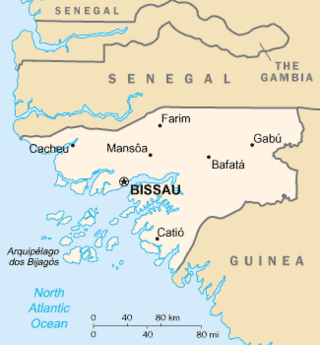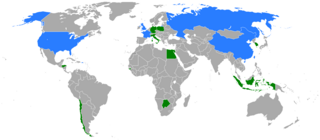United Nations Security Council Resolution 275, adopted on December 22, 1969, after a letter from the representative of Guinea and observing that these incidents by Portugal jeopardize international peace and security, the Council called upon Portugal to desist from violating the sovereignty and territorial integrity of Guinea. The Council deeply deplored the loss of life and heavy damage to several Guinean villages inflicted by the action from Guinea-Bissau, a territory under Portuguese administration, solemnly warning Portugal that if such acts were to be repeated in the future the Council would consider further steps to give effect to the resolution. It also called upon Portugal to release a motor barge by the name of Patrice Lumumba and all of its passengers.
United Nations Security Council Resolution 295, was adopted unanimously on August 3, 1971. After receiving a letter from the Permanent Representative of Guinea, a country led by Ahmed Sékou Touré, the Council affirmed its territorial integrity and independence and decided to send a mission of three members of the Council to Guinea to consult with the authorities and report of the situation immediately. The mission was to be appointed after consultation between the president of the Council and the Secretary-General.
United Nations Security Council Resolution 302, adopted on November 24, 1971, after reaffirming previous resolutions on the topic, the Council expressed its appreciation for the work accomplished by the Special Mission established in resolution 294. The Council deplored the lack of co-operation with the Special Mission by the Portuguese and called upon its government to take effective measures so that the territorial integrity of Senegal would be respected and to prevent acts of violence and destruction against the territory and its people.
United Nations Security Council Resolution 312, adopted on February 4, 1972, after reaffirming previous resolutions on the topic and deploring those who failed to conform to them the Council called upon Portugal to immediately recognize the right of the peoples of her colonies to self-determination, to cease all acts of repression against the peoples of Angola, Mozambique and Guinea (Bissau), to withdraw its armed forces from those areas, to promulgate an unconditional political amnesty and to transfer power to freely elected native representative institutions.

United Nations Security Council Resolution 322, adopted unanimously on November 22, 1972, after reaffirming previous resolutions and considering the Organisation of African Unity's recognition of the revolutionary movements of Angola, Guinea-Bissau, Cape Verde and Mozambique, the Council called on the government of Portugal to cease its military operations and all acts of repression against the people of those territories. The Resolution called on Portugal to enter negotiations with the parties concerned with a view to achieving a solution to the armed confrontations and permitting the peoples of those territories to exercise their right to self-determination and requested the Secretary-General to follow developments and report periodically to the Council.
Operation Green Sea was an amphibious attack on Conakry, the capital of Guinea, by between 350 and 420 Portuguese soldiers and Portuguese-led Guinean fighters in November 1970. The goals of the operation included the overthrow of Ahmed Sékou Touré's government, capture of the leader of the African Party for the Independence of Guinea and Cape Verde (PAIGC), Amílcar Cabral, destruction of the naval and air assets of the PAIGC and its Guinean supporters, and the rescue of Portuguese POWs held in Conakry.

The United Nations Peacebuilding Support Office in Guinea-Bissau (UNOGBIS) was established by the United Nations Security Council in its Resolution 1233 in April 1999 to facilitate the general election and implementation of the Abuja Accord.

United Nations Security Council resolution 1216 was adopted unanimously on 21 December 1998. After expressing concern at the crisis and humanitarian situation in Guinea-Bissau, the Council called for the immediate establishment of a government of national unity in the National People's Assembly and the holding of elections by the end of March 1999.

United Nations Security Council resolution 1233, adopted unanimously on 6 April 1999, after reaffirming Resolution 1216 (1998) on the situation in Guinea-Bissau, the council established the United Nations Peacebuilding Support Office in Guinea-Bissau (UNOGBIS) to facilitate the implementation of the Abuja Accord.

United Nations Security Council resolution 1580, adopted unanimously on 22 December 2004, after reaffirming resolutions 1216 (1998) and 1233 (1999) on the situation in Guinea-Bissau, the Council extended the mandate of the United Nations Peacebuilding Support Office in Guinea-Bissau (UNOGBIS) for a further period of one year and revised its operations. It was the final Security Council resolution adopted in 2004.

United Nations Security Council Resolution 1949, adopted unanimously on 23 November 2010, after recalling previous resolutions on the situation in Guinea-Bissau, particularly Resolution 1876 (2009), the Council extended the mandate of the United Nations Integrated Peacebuilding Office in Guinea-Bissau (UNIOGBIS) for a further period of one year until 31 December 2011.

The United Nations Integrated Peacebuilding Office in Guinea-Bissau (UNIOGBIS) is a United Nations peacebuilding mission in Guinea-Bissau.
The following lists events that happened during 2010 in the Republic of Guinea-Bissau.

The 1995 United Nations Security Council election was held on 8 November 1995 at United Nations Headquarters in New York City during the 50th session of the United Nations General Assembly. The General Assembly elected five non-permanent members of the UN Security Council for two-year terms commencing on 1 January 1996.
United Nations Security Council Resolution 1876 was unanimously adopted on 26 June 2009.

United Nations Security Council Resolution 2030 was unanimously adopted on 21 December 2011 after recalling resolution 1949 (2010). The Council called on the Government and political stakeholders in Guinea-Bissau to work together to consolidate peace and stability, use legal and peaceful means to resolve differences and intensify efforts for genuine and inclusive political dialogue and national reconciliation.

The 1993 United Nations Security Council election was held on 29 October 1993 during the Forty-eighth session of the United Nations General Assembly, held at United Nations Headquarters in New York City. The General Assembly elected Argentina, the Czech Republic, Nigeria, Oman, and Rwanda, as the five new non-permanent members of the UN Security Council for two-year mandates commencing on 1 January 1994. Oman and Rwanda were elected for the first time ever, while the Czech Republic was elected for the first time as a separate country after the dissolution of Czechoslovakia.
Major General Mamadu Ture Kuruma is a Bissau-Guinean military vice-chief of staff and the leader of the Military Command that took power following a coup against acting president Raimundo Pereira and former prime minister and leading candidate for president Carlos Gomes Júnior. On 13 April, he promised to form a national unity government within days. On 18 May 2012, the United Nations Security Council adopted a resolution on the travel ban for members of the Military Command, including Kuruma.

United Nations Security Council Resolution 2048 was unanimously adopted on 18 May 2012.

The Republic of Korea and the Democratic People's Republic of Korea were simultaneously admitted to the United Nations (UN) in 1991. On 8 August 1991, the UN Security Council passed Resolution 702, recommending both states to the General Assembly for membership. On 17 September 1991, the General Assembly admitted both countries under Resolution 46/1.









